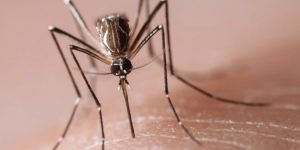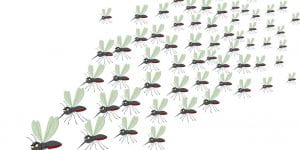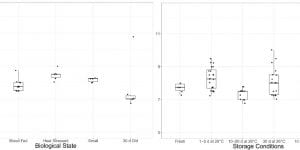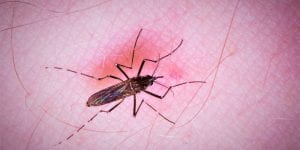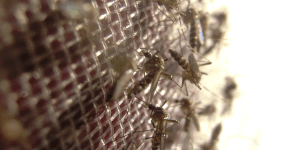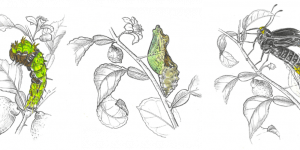Category: News
-
Dengue-blocking bacteria endure the heat
“This article was first published on Pursuit. Read the original article.” Dr Perran Stott-Ross and Professor Ary Hoffmann Bushfires. Coral bleaching. Heatwaves. These disastrous events are a harsh reality in Australia. And they’re only going to become more frequent and severe with climate change. Last year, 2019, was Australia’s hottest year ever recorded, and records […]blogs.unimelb.edu.au/pearg/2020/01/24/dengue-blocking-bacteria-endure-the-heat
-
With great power comes great responsibility…
Words: Samantha Ward Images: Words: Samantha Ward & Marianne Coquilleau Flying the flag for the PEARG lab! [Photo credit: Marianne Coquilleau] I am a scientist. A taxonomist, to be more specific. Taxonomy is the study of naming, defining, and categorising organisms. There’s a job for that?! Actually, we still have no idea how many species […]blogs.unimelb.edu.au/pearg/2019/12/19/with-great-power-comes-great-responsibility
-
Ary featured in Grains Research and Development Corporation video: Redlegged Earth Mite – resistance evolution
-
Jessica Chung – bioinformatician, data wrangler
Words: Tim Thwaites, Science writer Banner image credit Casamento Photography Tracking disease-carrying mosquitoes, helping to conserve mountain pygmy possums, stopping the spread of dengue fever, studying how insects develop resistance to pesticides—solving such disparate biological problems nowadays depends on being able to handle enormous quantities of genomic data. And that’s why they land on the […]blogs.unimelb.edu.au/pearg/2019/12/02/jessica-chung-bioinformatician-data-wrangler
-
Variability in mosquito host-seeking ability
Words and images: Meng-Jia Lau Behaviour is one of the most complex study areas in biology because it involves a combination of many factors that are often quite variable. In mosquitoes, host-seeking is the behaviour of females seeking a blood meal which provides the extra protein they need in order to lay eggs. The biting […]blogs.unimelb.edu.au/pearg/2019/11/28/variability-in-mosquito-host-seeking-ability
-
Faster and cheaper without compromising quality
Words: Nick Bell When our scientific endeavours leave the lab and move into real-world deployment, a number of challenges crop up. Aside from obvious issues around myriad variables that cannot be controlled as they can in the lab, large scale logistical and financial considerations need to be made when rolling out new operations. This scaling […]blogs.unimelb.edu.au/pearg/2019/11/22/faster-and-cheaper-without-compromising-quality
-
Establishment of Wolbachia Strain wAlbB in Malaysian Populations of Aedes aegypti for Dengue Control
Our freshly published open access paper in Current Biology is the culmination of several years of work with a large team of very talented and dedicated researchers. Rather than rehash the story here, please see press releases below: Press release from the UniMelb newsroom (alternatively at Bio21’s siteBio21’s site or at SciMex) Brief summary article […] -
Lab-reared mosquitoes maintain their lust for blood
Words and images: Perran Ross Modified mosquitoes raised in laboratories are being released into the wild in disease control programs. These mosquitoes will still bite you, but they’re less capable of transmitting the viruses that cause dengue fever, Zika and more. This antiviral effect is caused by infection with a bacterium called Wolbachia, which occurs […]blogs.unimelb.edu.au/pearg/2019/11/07/lab-reared-mosquitoes-maintain-their-lust-for-blood
-
Getting revegetation right with genetics
This article was first published on Pursuit. Read the original article. Professor Ary Hoffmann Eucalypts, wattles, banksias, grevilleas and other Australian native plants are some of the most fascinating and unique flora on Earth. They also play an important part in revegetation programs around Australia, which aim to restore plant-life to areas where the species […]blogs.unimelb.edu.au/pearg/2019/10/22/getting-revegetation-right-with-genetics
-
Investigating metamorphosis
Words: Véronique Paris Cover image art: © Marianne Coquilleau & Butterfly Adventures Almost every child is familiar with the famous story ‘The Very Hungry Caterpillar’, illustrating the transformation of an unremarkable hungry caterpillar into a beautiful butterfly. What exactly takes place within the pupal cocoon during the transformation remains a mystery. The scientific definition of […]blogs.unimelb.edu.au/pearg/2019/09/23/investigating-metamorphosis
Number of posts found: 66
